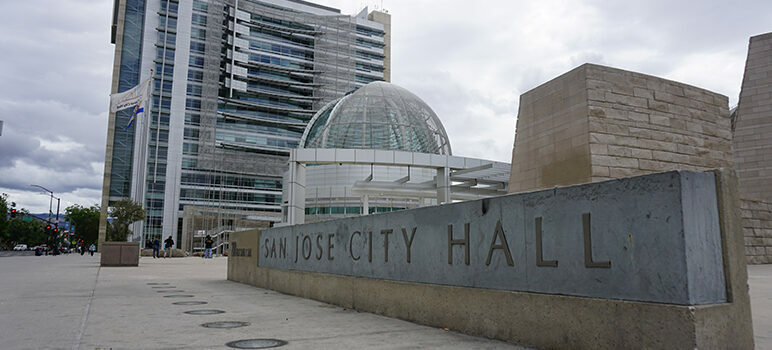Amidst this pandemic, an unusual yet welcome thing happened last month: seconds before speaking publicly during the San Jose City Council’s weekly meeting, one of us was cooking a complex dinner from the comfort of his kitchen less than two miles away.
It was a surreal experience: rather than waiting in the same staid room for hours to speak, it took only minutes to meaningfully participate.
Across Silicon Valley, council meetings run late into the evening. The agendas are unpredictable. For those attending and planning to speak, you have no idea when “your item will be heard.”
So all you can do is sit and wait. And wait.
One result: stakeholders at council meetings are often starving because they can’t squeeze in a meal while closely following deliberations. In addition, having to be physically present takes away from quality personal time.
These examples scratch the surface of the many challenges local governments face when engaging constituents in decision-making.
How can we expect the average community member to get involved when this process is a guessing game at best, a total pain at worst?
It doesn’t have to be this way.
This current coronavirus crisis forces all of us to operate differently—and in some ways, better. What lessons are we taking from this trying time to make city governments more accessible and inclusive? How can we create more options to participate remotely?
Smart Growth America highlighted what may be the first intensive community engagement process conducted completely virtually because of the virus in Missoula, Montana. Just like in person, stakeholders answered survey questions, viewed drawings and expressed preferences on them, and added markers on interactive maps. The designers of the process estimated a potential cost savings of 25 to 40 percent, coupled with more people participating than in-person engagement.
Heck, even the U.S. Supreme Court, an institution not known for innovation and accessibility, is allowing the public to listen in as justices participate remotely. Congress members were able to vote remotely this month.
Whenever the pandemic subsides, public meetings will understandably be held in person again. However, we encourage governments not to simply go back to the old way. New ways of engaging the community lead to more participation in democracy’s processes.
When cities host community meetings, could they create an interactive livestream video so folks could participate remotely yet in real-time? Governments could contract with community members to set up livestreaming for them. Livestreaming reduces the need for stakeholders to find childcare, go to City Hall, or pay for public transit or parking.
Could we allow people to videotape messages from home & have them shown to the City Council before it deliberates, as if individuals were in the room?
Could we create a virtual queue providing real-time estimates to the public on when items might be heard and/or when someone’s time to speak may begin?
More remote participation can mean less traffic on our roads, less stress of racing somewhere, lower transportation costs, and more personal time.
As we look down the hill of this crisis, we could create a public-private partnership to formulate recommendations on improving civic engagement. Catalyze SV welcomes working with city governments, private sector companies providing civic engagement tools and other excellent nonprofits leading on community engagement.
Let’s think outside the box. As a community leader recently shared, “let’s not take in-person events and cram them into Zoom; rather, let’s think of entirely new ways for the community to get together and work together.”
When stakeholders can more easily participate, governments get better results and public trust in government grows. Let’s learn from the crisis by improving the ways we engage communities in our democracy.
Ryan Sebastian is the principal of Moveable Cos. Joe Escobar is a board member of Catalyze SV and Alex Shoor is its executive director. Opinions are the author’s own and do not necessarily reflect those of San Jose Inside. Send op-ed pitches to
co******@me*******.com
" target="_blank" rel="noopener noreferrer">
co******@me*******.com
.


Likewise, investigators should get access to Carrillo’s contact lists and to records of calls to accomplices or collaborators.
This comment is on an article posted in 2020.